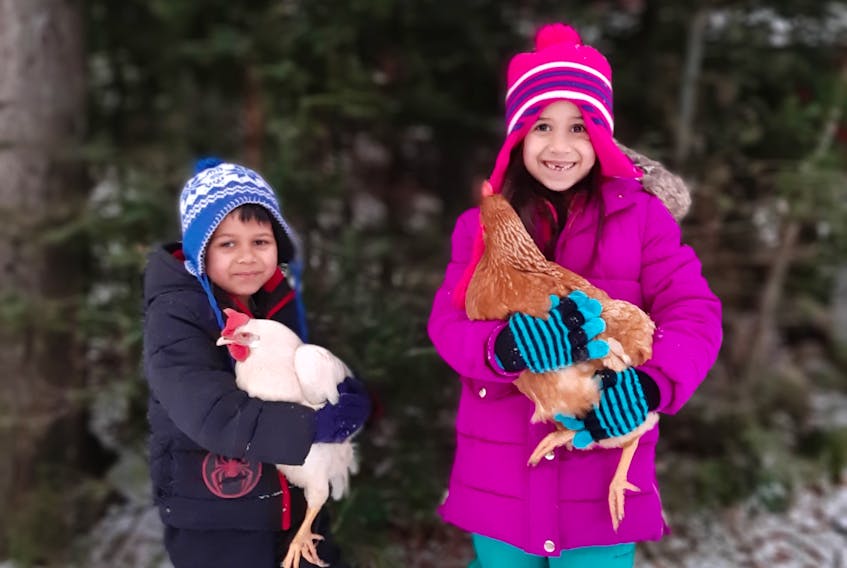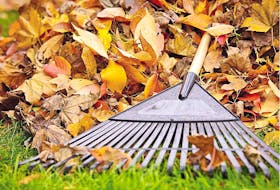Eleven years ago, while pregnant with her oldest child, Andrea Munroe built her first backyard chicken coop in downtown Truro, N.S.
The owner/operator of Enchanted Forest Natural Parenting says the experience has been invaluable for their family.
“I love the experiential learning that gardening and keeping hens provide for my three children,” she says. “They're learning everything from caretaking responsibility to biology, to math, as well as enjoying a more tangible connection to food, and the plain old joy of loving animals and pets.”
With a background in plant sciences and organic agriculture, plus a natural disposition for research, by the time she was ready to get started with her flock, she was well-prepared for the logistics, but the emotional side had to be learned as she went.
“The surprises for me were the ones that are difficult to explore before having chickens,” she says. “On the downside, the emotional hardship of losing a hen to disease or a predator; and on the bright side, the joy of a warm egg in your hand, and the delight in the personality and antics of silly hens.”
'Beloved pets'
A common misconception about chicken owners is that once things are set up, there will be an abundance of free eggs. While Munroe says the eggs her family receives are so much tastier than grocery store eggs, it isn’t always easy to get the hens to produce them. Factors like broodiness, moulting or the natural slowdown in production during shorter winter days can cause the hens to stop laying for periods of time.

There are also costs associated with maintaining a flock that offset the “free” eggs.
“The reality is that unless you can free-range your birds, you're likely going to be spending more than you think you will on feed and other supplies,” she says. “While we do offer our hens kitchen scraps and allow them to forage around the yard for a few hours a day, as they're excellent for tick control, we have to be careful. A loose neighbourhood dog can kill your flock in 30 seconds with you standing right there, helpless.”
Despite the challenges, Munroe says her six chickens are part of the family, all with names and distinct personalities.
“I think many people would be surprised to learn just how hilariously quirky and sweet hens can be, and how personable, especially when raised from young chicks. Ours will come running when called, a hilarious sight, and they can be just as affectionate or standoffish as cats, and can truly become beloved pets,” she says.
‘Knowing where our food comes from’
Shelly Juurlink started her backyard chicken flock about 18 months ago. She had worked in agriculture in Ontario for many years, but it wasn’t until she moved back home to Nova Scotia with her young family that she decided to put those skills into practice with her flock.
“I wanted our kids to grow up knowing where our food comes from and how it is produced and to appreciate the amount of work that goes into caring for animals,” says Juurlink, who lives in the Halifax Regional Municipality.
Despite her professional background, there was still a learning curve, as most of her previous experience was in dairy. She found support in online groups, as well as from neighbours who were also raising chickens.
“Once you get dialled into your set up, it is actually quite easy and so much fun,” she says. “These chickens have amazing personalities. They follow us around and it’s fun to watch them exhibit natural behaviours, such as dust bathing, for example, in the yard.”
While most of the reactions to her chickens are positive, she has received occasional negative feedback.
“I think some people are unsupportive because they have fears of increased predators in the area or that chickens are unsightly in a yard,” she says. “It's unfortunate because I feel they are truly a benefit.”
Juurlink would love to see the trend of community gardens extend to community chicken coops, where a group of neighbours set up a coop and work together to house and care for the chickens.
Beyond the benefits of the eggs and natural garden compost created from the hens, along with natural tick control, she says it also provides an opportunity to learn about food security issues and take ownership of the food process.
Munroe agrees, and says while raising chickens can be a lot of work, it’s also lots of fun.
“Raising hens means learning a lot before you start and learning way more as you go along,” she says. “The purpose of backyard hens lies not just in the way that ‘my pets make me breakfast’ but in the joy and learning they bring our family.”
Four tips to help chickens thrive in the winter
1. Keep the temperature comfortable in the coop by creating a balance between ventilation and draft protection. Ventilation should be focused near the top to allow the chickens to retain their body heat below. The base of the coop can be kept warm and dry through layers of straw, wood chips or old leaves (which turn into a garden compost) and wrapping part of the exterior in plastic.
2. Chickens are photosensitive and stop laying when it gets dark outside. Combat this by installing a clear plastic roof for natural light and/or add coop lights on a timer.
3. Set up a system to prevent the water and eggs from freezing. Some options are to bring fresh water out a few times daily and collect the eggs then, set up an electric waterer or create your own do-it-yourself solution, such as Munroe did with a five-gallon water bucket with horizontal nipples and a de-icer with a seedling heat mat on a timer for the eggs.
4. Because free-ranging is limited for hens in the winter, owners need to help them keep their minds and bodies stimulated. This can be done through sprinkling cracked corn through the coop that they need to search out, adding a xylophone, swing or other “chicken toys” to the coop, and offering playful treats like mealworms, spaghetti noodles, sprouted greens or hanging cabbage to get some playtime in while they snack.
Related
Nova Scotia woman shows support of female sports through volunteering









